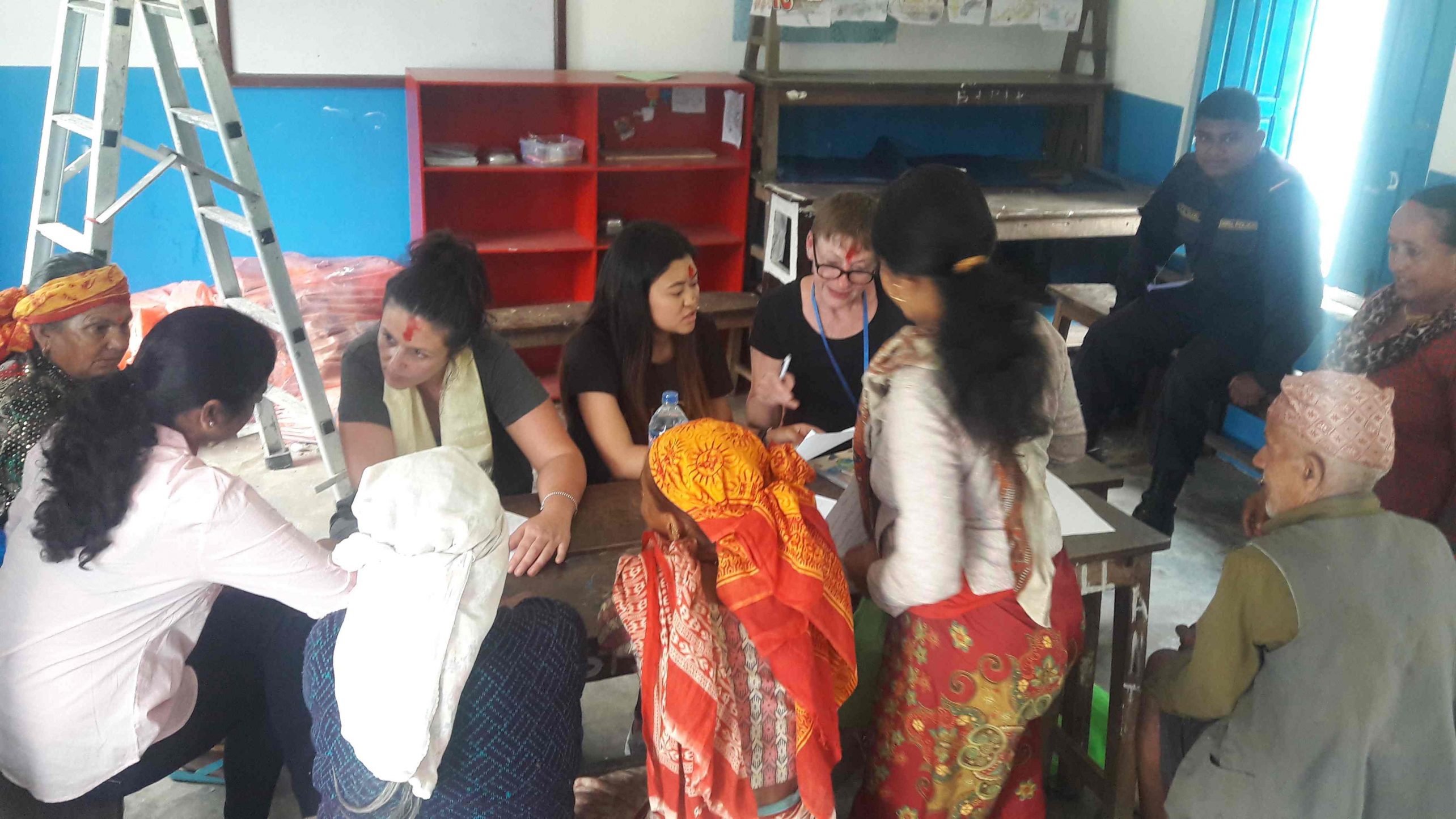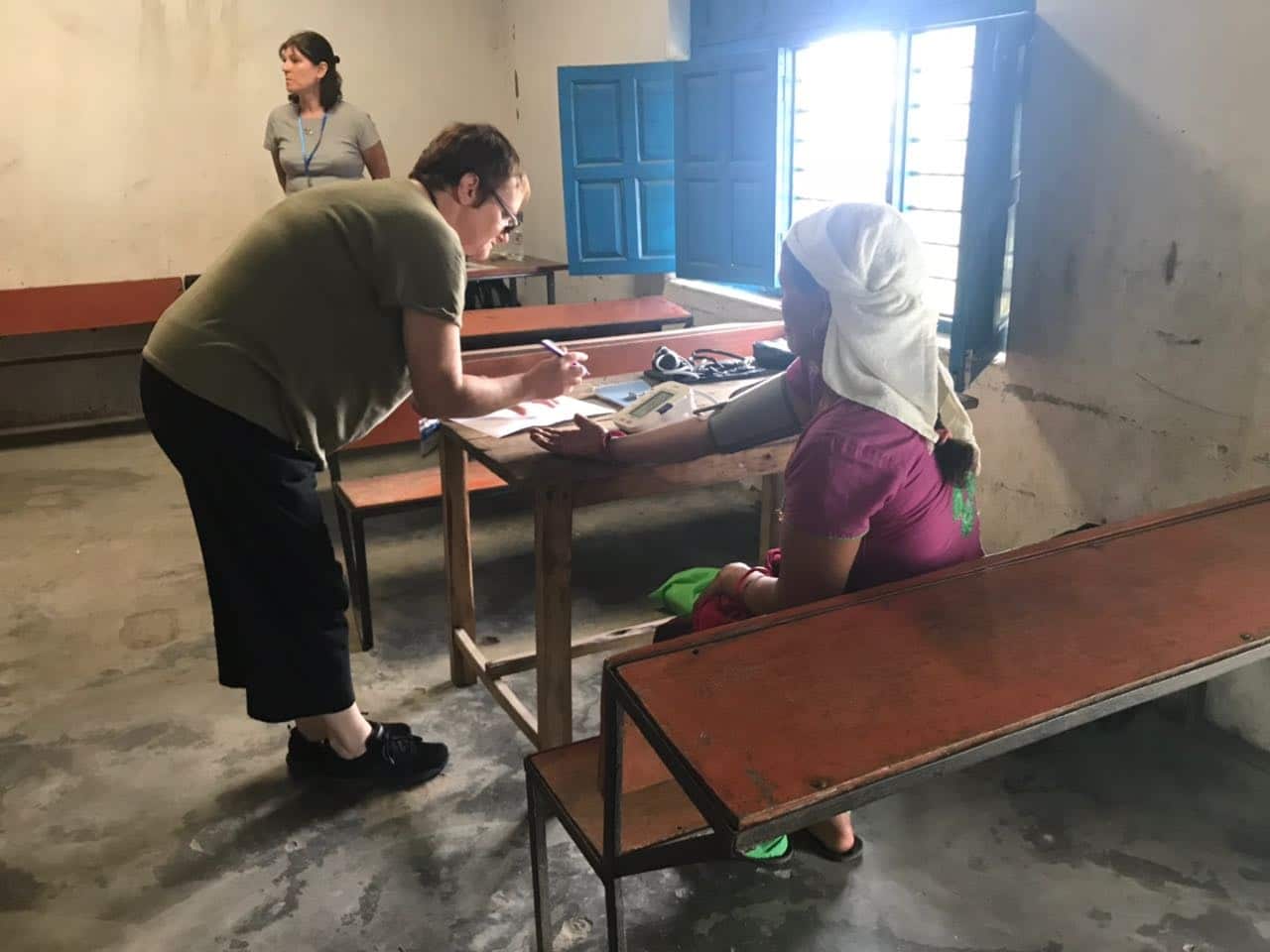Health Outreach in Nepal – Queen’s Nurses Share Their Stories
25 April 2019 | Diane Gould, Sue Halliwell, Hazel Dent
A group of Queen’s Nurses travelled to Nepal to volunteer in health clinics for the first time in 2016 and repeated their visit in early 2018. In this blog, Queen’s Nurses Diane Gould, Sue Halliwell and Hazel Dent share their stories from their third trip to Nepal in late 2018.
Travel isn’t always pretty. It isn’t always comfortable. Sometimes it hurts, it even breaks your heart. But that’s okay. The journey changes you; it should change you. It leaves marks on your memory, on your consciousness, on your heart, and on your body. You take something with you. Hopefully, you leave something good behind.
Anthony BourdainDiane Gould, Queen’s Nurse
It was wonderful to return to Nepal, two years after our last visit. Sue Halliwell and I learnt so much in the process of organising the 2016 trip, working closely with Global Vision International (GVI). GVI contacted us again, as they were so impressed by the work the group had done previously.
The community remembered us and there were far more people than before attending our outreach screening clinics (over one hundred people or more in one morning). Some people walked barefoot for hours over mountains to attend the clinics and waited patiently to see us.
As well as screening clinics we visited Samrakshak Samuha Nepal (SASANE), a nonprofit organisation established in 2008 with the mission to support and empower women survivors of human trafficking and gender-based violence as well as women and girls at risk of being trafficked or re-trafficked.
We provided fun and interactive first aid classes, covering risks that women may come across during cookery, such as fainting, choking and injuries caused by knives. We also visited a local secondary school and delivered workshops on a variety of subjects, for example first aid, dehydration and oral health.
Organ trafficking is a major problem in many countries including Nepal. For this reason, it was important to explain that kidneys do not grow back if people are persuaded by traffickers to sell them. There is a need to raise people’s awareness of the problem, the perils of organ trafficking and the severe health consequences of selling a kidney.
It was good to see the progress made in the community over the past two years. Although we were only there for a short time, we had a chance to meet old friends and make new ones. Hopefully we made a small change that can be sustained and built upon. Our screening data will be used by GVI to shape and guide future projects.
Nepal and its people will always remain in my heart; it draws you in, it touches your heart, it transforms you. I hope that we will return again.

Sue Halliwell, Queen’s Nurse
Our days were enjoyable, although hot and humid. There was so much to learn about Nepal, the people and their culture.
During our time there, we undertook Health Assessment Clinics in Pokhara and the outlying villages of Male Paton, Pame and Bandipoor. Health problems, as previously described in blogs in 2017 and 2018, continued to be a theme including hypertension, diabetes, epigastric problems, muscular-skeletal and uro-gynae problems. We covered a variety of health promotion subjects with hygiene/dental advice and exercise sessions and instruction for muscular problems. There was also a visit to SASANE, a home for young women who have been victims of trafficking.
On reflection, it was great to see the changes that are happening three years on from the devastating earthquake. The improvements in the infrastructure as donated monies are now filtering through have made a real difference. Areas such as Bandipoor that suffered significantly during the earthquake are beginning to thrive again as improvements are made and tourists return.
From my previous visit and other healthcare outreach work I have undertaken, I have realised that great changes cannot be made in an instant – neither should they, if they are to be self-sustaining within a community and following generations. We must respect culture, traditions and lifestyle, approaching gently to change things where we believe we can help improve. This time we witnessed how the villagers are striving to make changes within their communities and schools by coming together and working towards the shared future.
GVI have many ongoing projects and future plans involving volunteers and local people, one of these being the purchase of an ambulance for Pame village. They hope to construct an ambulance base whilst villagers are raising money for the purchase of the vehicle itself. GVI are one of many organisations attempting to bring about change in small ways. I hope our Queen’s Nurse volunteer group has again contributed to these efforts.

Hazel Dent, Queen’s Nurse
Our volunteer programme was based around Pokhara, the second largest city in Nepal. The programme was set up by Global Vision International (GVI), an organisation that engages with local and global issues by operating education, training programmes and voluntary work projects alongside local communities. Nepal is one of several poor developing countries in the world that faces significant challenges in providing universal health coverage and equitable medical care.
I was a newbie to volunteering overseas, but not as a visitor to Nepal. As a tourist /trekker in 2015 (returning home to England two weeks before the earthquake) I increased my understanding of Nepal as a developing country. Following the earthquake and because of it, I can see improvements in Nepal’s infrastructure, including electricity supply. It was also good to see significant support from other countries working with the Nepali government.
As a newbie volunteer, I respected that I was a guest in that country and in that community. Therefore, in order to support local communities with their health needs, I worked directly with them, respecting their culture and way of life. It was refreshing to see how villagers are working together with their local schools as a community addressing their own health issues.
Nepal is still struggling with its healthcare provision, with poor access to health care facilities in rural areas and lack of funding for the poor, who cannot afford medication. This programme, including Health Assessment data, will assist GVI and local doctors in targeting the ongoing and future needs of these communities. Through this healthcare work, I have increased my awareness and understanding of healthcare needs and issues in the communities of Nepal, with an emphasis on preventative health measures.
From this programme, I have further developed my understanding of how a team works. We had different clinical backgrounds, but all worked cohesively showing care and compassion to achieve our objective in supporting local communities. This included Health Assessment Clinics, screening 300 people, health promotion/education sessions to 140 people and health-related skills for the community, including in schools. It was one of the most memorable days in my nursing career when we screened 150 people in one session; it was such a team achievement.
This experience has made me more fully appreciate our free access to health care and services. I am aware that my contribution to this programme only scratches the surface, but building upon each successive volunteer mission, this will make a lasting difference to these Nepali communities.

 Back to Blog
Back to Blog